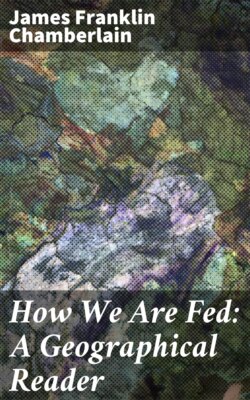Читать книгу How We Are Fed: A Geographical Reader - James Franklin Chamberlain - Страница 5
На сайте Литреса книга снята с продажи.
THE PAST AND THE PRESENT
ОглавлениеTable of Contents
Long, long ago people did not live as we do to-day. Their homes were very different from ours, for they were made of the skins of wild animals, of the limbs and bark of trees, or of tall grasses. There were no stoves, chairs, tables, or beds in their houses. Instead of lamps, gas, or electricity, a fire on the dirt floor or in front of the house, furnished the light.
The clothing of these people was as simple as their homes. It was made of skins and furs in cold countries and in warm countries of braided grasses and the fibers of certain plants. You may be sure that tailors and dressmakers were not consulted as to the latest styles, for the styles did not change and there were neither tailors nor dressmakers to talk to. Each family made its own clothing, and there was not a sewing machine to be found.
How would you like to use a bone for a needle? Sometimes, instead of sharpened bones, long thorns were used. The sinews of the deer, or of some other animal, usually furnished the thread.
When the people were in need of food, they went into the forest and gathered roots, nuts, and fruits. Wild animals were killed by means of such weapons as bows and arrows and spears, and fish were caught in the lakes and streams.
The food was not cooked as ours is; for, as I have told you, there were no stoves. Sometimes the meat was broiled over the fire, sometimes baked in a hole filled with ashes and coals, but it was often eaten raw. It was not easy to have a variety of food, and there were times when it was very difficult to obtain anything. When food was abundant, the people feasted, and when it was scarce, they were often hungry. How would you like to wait for your breakfast while your father went to the woods or to the river in search of something to eat?
When the meals were prepared, they were not neatly served as yours are, but each person took his portion and sat on the ground while he ate it.
Fig. 1.—Indians at Dinner.
All of this seems very strange to you, I know. If you live in the city, you are accustomed to seeing the butcher, the baker, the milkman, and the grocer call every day. There are stores where people can buy whatever they want to eat, drink, or wear. You wonder how any one could live in such a way as I have described, but there are people who live in this fashion to-day, although you have never seen any of them. They are uncivilized. Where do you think they are to be found? When people live in this way, it takes most of their time to provide themselves with the things that are necessary to life. They have little opportunity to improve their ways of living and of thinking.
Civilized people divide their work. Some provide food, some make clothing, some build houses, and some furnish fuel. Each one does his or her part. In this way, you see, they learn to do their work better and better, because each gives much time and thought to one kind of work. This plan gives each one time to study and to learn something about the world and its people. Think how much better our homes, our clothing, and our food are, than are those of uncivilized people, and how many other advantages we have.
Fig. 2.—White People at Dinner.
It is only possible to live as we do, when each one works for others as well as for himself. If any one fails to do his part, the rest must suffer until some one is found to take his place. It is to prepare yourself to do your part in some useful work for others, that you are going to school day by day. You do not now know just what that work is to be, but I want you to remember that all honest work is noble. It is not so important what work you do, as it is that you should do your work well. No matter what your work may be, you can carry sunshine in your face and helpfulness in your heart. If you do this, you will be known and loved. Hard work, coarse clothes, and lack of money can never hide these things, neither will the finest of clothing cover a selfish or untruthful nature.
Let us look at this dinner table loaded with good things to eat and drink. There are bread, butter, meat, vegetables, milk, tea, fruits, and other things. You see at once that many persons must have worked to provide this food, for only a small part of the work was done in the kitchen. If these things could but speak, they might tell you stories as wonderful as fairy tales. They have been gathered here from the fertile plains of the West, from the sunny South, from Brazil, from the islands of the Pacific Ocean, from far-off China, and even from the waters of the sea.
